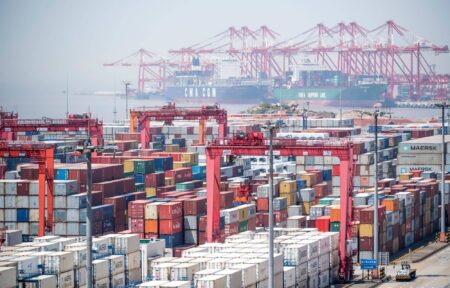The transformative effects of DeFi on advancing financial inclusion, assisting African trade, and strengthening Africa’s economy match the technology with the global sustainability agenda and the UN Sustainable Development Goals.
- As per Forbes estimates, the total locked value in DeFi protocols stands at nearly $43 billion.
- DeFi denotes an entirely new financial rail separate from the banking system, capable of providing the same range of services as a bank, from savings, mortgages and loans to diverse contractual arrangements and asset trading.
- DeFi helps to create cross-border value chains for consumer goods and food processing by connecting African traders, significantly reducing post-agricultural losses for perishable goods.
What is DeFi
Decentralised finance (DeFi) represents the newest catchphrase in the finance landscape. Global finance has exponentially grown over the past five years, boosted by the advancements in digital finance pandemic impacts. As per Forbes estimates, the total locked value in DeFi protocols stands at nearly $43 billion.
DeFi is a system that uses distributed ledger technology (DLT) and crypto to fulfil financial transactions. Crypto, blockchain and DLT have existed for over a decade, creating a fair share of speculation and hype.
ALSO READ: Decentralized finance: Redefining financial transactions in the digital economy
Part of the cryptocurrency’s pronounced weaknesses stems from the fact that only a few find use in their specified purpose: making payments and replacing the current financial services. However, a large share of the crypto ecosystem represents speculative assets from which investors seek to make quick profits instead of building a substitute financial structure.
However, with DeFi, blockchain may well have found its breakthrough technology. DeFi is decentralised, in contrast to conventional saving and lending, which incorporate centralised financial entities, banks, and regulatory agencies. DeFi allows borrowers and lenders to deal directly with one another. As such, they can transfer value through crypto and handle all data operations on the blockchain.
As a result, DeFi denotes an entirely new financial rail separate from the banking system, capable of providing the same range of services as a bank, from savings, mortgages and loans to diverse contractual arrangements and asset trading.
Positive effects of DeFi on African trade and businesses
Better lending incentives
DeFi removes lending barriers for African businesses. For instance, an African SME processing tea for export has to navigate through compliance, due diligence, and know-your-customer (KYC) hurdles to get credit approvals from the bank.
Even if seamless, these procedures can take months to complete, with the funding proving costly. But DeFi automates all processes. Immediately blockchain onboards a borrower, a loan can get processed in a few minutes and the funds disbursed instantly.
This quality of the new financial structure means that anyone, not just banks, can offer liquidity to businesses through DeFi, with the borrowers only going through the KYC process once. Borrowers need not restart the process when they deal with a different lender.
Moreover, DeFi is cheaper than conventional lending and can offer higher returns to investors. Most loans in Africa come with high interest, making them unaffordable to borrowers.
DeFi helps borrowers and lenders take advantage of the lack of an intermediary or the need for a margin to acquire higher returns and lower interests. Furthermore, the lending can happen with no transfer charges and currency exchange fees, a further cost reduction attribute.
Smart contracts
Another positive attribute of DeFi is the use of smart contracts. Smart contracts are agreements written in computer codes and programmed to fulfil transactions once specific conditions are met automatically.
For instance, once an importer receives a shipment with the right documentation, the payment automatically goes through to the exporter’s bank at a price in the smart contract. The price could represent an agreed market rate or a fixed price. Entrenching complex contractual terms within the cryptocurrency code greatly enhances the speed, transparency, and efficiency of transactions to benefit borrowers and lenders.
Linking DeFi and African trade might seem contradictory, considering that crypto is usually linked with multinational investors instead of African businesses. Nevertheless, for digital finance, users need not understand the details of the underlying system or technology – in this case, DeFi – or even that they are using cryptocurrency.
Users can transact DeFi through a decentralised app (dApp) or a phone chat function, taking advantage of the growing usage of apps like Messenger, Telegram, and WhatsApp. These possibilities open up financial services to anyone with access to a cell phone, practically incorporating every African adult.
The possible transformative effects of DeFi and African trade

Most conventional finance institutions shy away from financing low-ticket deals. Most banks with an appetite to finance African trade regard deals worth less than $5 million as unworthy of the resources and time required to risk assessment and lending structuring. This stance locks out most creditworthy businesses and traders. However, through DeFi, traders can access micro and medium-level loans to fill in the gaps that banks cannot.
DeFi can also help lower the costs and complexity of cross-border trade in multiple jurisdictions and currencies. Take, for instance, a trader from Kenya buying sugar from Zambia for sale in Kenya. The trader must first convert local currency to USD cash (usually at a high cost), carry the money in their truck, and drive to Zambia to purchase the product before returning to Kenya to sell the sugar.
This process is time-consuming and costly. It also risks the trader losing the cash to thieve or through shake-downs by corrupt border officers. DeFi helps traders cross the border cashless and conduct all their transactions via a mobile phone without currency restrictions.
ALSO READ: Breaking the Bias: Women inclusion key to unlocking profits
The effects of DeFi in the AfCFTA
The many advantages of DeFi could be an influential asset in implementing the Africa Continental Free Trade Area (AfCFTA). The agreement has created a single market for services and goods in Africa. Nevertheless, currency variations stand in the way of activating the full benefits.
Consequently, traders conduct most of their cross-border deals in USD or the Euro, magnifying the cost and compliance barriers. DeFi resolves these challenges by allowing cross-border businesses to transact through local currencies. The traders can convert the currencies into cryptocurrencies and make instant transfers.
DeFi helps to create cross-border value chains for consumer goods and food processing by connecting African traders, significantly reducing post-agricultural losses for perishable goods. The linkage also decreases dependence on costly processed food imports.
In the long term, DeFi might also aid in resolving one of Africa’s most pressing challenges: getting finances to “the last mile,” or communities and businesses operating remotely in peripheral and rural regions. In recent years, mobile banking has mainly supplied last-mile financial services through mobile banking apps or wallets.
Mobile banking has significantly boosted financial inclusion, but these services are highly costly to low-income families. Kenya’s prevalent M-Pesa payment tool, for instance, charges clients for each payment costing more than KSh100 ($0.83) and cross-border mobile transactions. On the other hand, a DeFi payment involving two users might be accessible regardless of the amount or location of the transacting parties.
Africa’s DeFi regulatory landscape
Nonetheless, African authorities have reignited their interest in the blockchain during the last two years, moving beyond bitcoin and examining more significant effects of DeFi in the financial system. Several African nations have established regulatory sandboxes in which blockchain startups are encouraged to develop DeFi solutions under the oversight and regulation of the central banks.
African central banks have explored creating digital currencies or CBDCs. CBDCs are exchangeable for any digital asset or token. CBDCs may enable African enterprises to conduct international business by leveraging blockchain’s integrity and the central bank’s credibility. Central banks can also use CBDCs to direct liquidity to economic areas where banks shy from investing.
Nigeria is the African pioneer in this field, introducing the eNaira in October 2021. It is not unexpected that the first African CBDC emerged from Nigeria, considering that 42% of the country’s population has adopted cryptocurrency, the highest percentage globally, according to Statista. The eNaira aims to raise financial inclusion, cut remittance costs, and formalise the informal sector.
Eventually, DeFi inventors and regulators must collaborate to grow this technology throughout Africa for optimal benefits. DeFi might provide inexpensive and quick liquidity pools for African merchants and SMEs, faster transactions, and enhanced security. And, for the last mile, DeFi may provide blockchain-based financial services that are inexpensive, if not free, quick, and accessible through any mobile phone.
The transformative effects of DeFi on advancing financial inclusion, assisting African trade, and strengthening Africa’s economy match the technology with the global sustainability agenda and the UN Sustainable Development Goals. As a result, the industry is an attractive investment for investors, asset managers, and pension funds seeking to make their portfolios more sustainable while directly addressing social implications.











